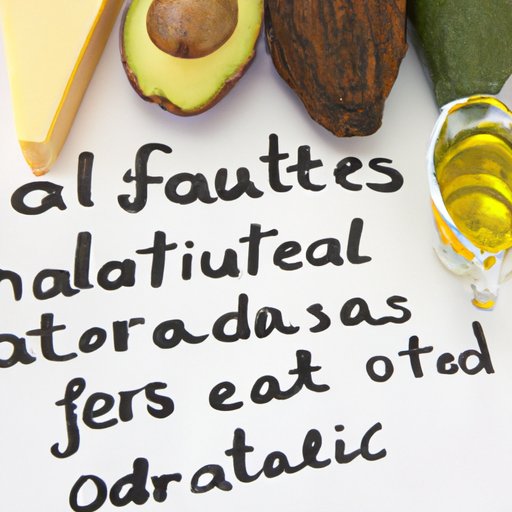Introduction
Eating healthy is essential for optimal health and wellbeing. The right foods can help you maintain a healthy weight, improve your energy levels, strengthen your immune system, and reduce your risk of developing chronic diseases. In this article, we’ll explore the basics of healthy eating, from identifying nutrient-dense foods to crafting meal plans that meet your individual dietary needs.
Highlighting Nutrient-Dense Foods for Optimal Health
Nutrient-dense foods are those that are packed with vitamins, minerals, fiber, and other beneficial compounds. These foods provide the highest amount of nutrients per calorie and should be the cornerstone of any healthy diet. Examples of nutrient-dense foods include fresh fruits and vegetables, lean proteins, whole grains, nuts, seeds, legumes, and low-fat dairy products.
Including these foods in your diet can have numerous benefits. Eating nutrient-dense foods helps keep your body properly nourished and energized, while also providing essential vitamins and minerals. Additionally, these foods tend to be naturally lower in calories than processed snacks, so they can help you maintain a healthy weight. Finally, nutrient-dense foods are often rich in antioxidants, which can help protect against oxidative stress and reduce inflammation.
Exploring the Benefits of Eating a Plant-Based Diet
A plant-based diet is one that focuses on consuming mostly plant-derived foods, such as fruits, vegetables, legumes, whole grains, nuts, and seeds. Research suggests that plant-based diets may offer several health benefits, including lowering cholesterol levels, reducing inflammation, and improving heart health. Additionally, a plant-based diet can be incredibly nutrient-dense, as it includes a wide variety of fruits and vegetables.
One of the main advantages of eating a plant-based diet is that it typically eliminates processed foods and animal products, which can be high in unhealthy saturated fats and added sugars. Additionally, plant-based diets tend to be higher in fiber, which can improve digestion and keep you feeling full for longer. Finally, many plant-based foods are naturally low in calories, making them a great choice if you’re trying to lose or maintain your weight.

Examining Different Types of Healthy Fats
Healthy fats are an important part of any balanced diet. While fat has long been vilified as an unhealthy food, research shows that certain types of fat can actually be beneficial for your health. Healthy fats include unsaturated fats, such as monounsaturated and polyunsaturated fats, which are found in sources like olive oil, avocados, nuts, and fatty fish.
These fats can help reduce inflammation and support heart health. They can also be beneficial for brain health, as some studies suggest that consuming healthy fats can improve cognitive function. Additionally, healthy fats can help keep your skin looking smooth and supple. Finally, consuming healthy fats can help keep you feeling full and satisfied for longer, making them a great addition to any weight loss plan.
Debunking Popular Diet Myths
When it comes to nutrition, there are a lot of misconceptions out there. For example, many people believe that all carbohydrates are bad for you, when in fact, complex carbohydrates like whole grains can be an important part of a healthy diet. Additionally, some people may think that cutting out entire food groups is necessary for weight loss, when in fact, eliminating too many foods can lead to nutrient deficiencies.
It’s important to get your nutrition information from reliable sources. Talk to your healthcare provider about any questions you have about nutrition, and look for evidence-based articles from reputable sources. Additionally, pay attention to food labels and ingredients lists, as this can help you identify potentially unhealthy additives.
Analyzing the Impact of Processed Foods on Nutrition
Processed foods are those that have been altered in some way, such as through canning, freezing, drying, or adding preservatives. While some processed foods, such as canned tomatoes and frozen vegetables, can be part of a healthy diet, others may contain unhealthy additives, such as added sugar and sodium. Additionally, many processed foods are high in calories but low in nutrients, making them less nutritious than their unprocessed counterparts.
It’s important to read food labels carefully when shopping. Look for foods that are made with minimal ingredients and avoid those with added sugars and sodium. Additionally, opt for unprocessed versions of foods whenever possible, such as fresh fruits and vegetables instead of canned or frozen.

Creating Meal Plans to Fit Your Lifestyle and Dietary Needs
Crafting a meal plan can help you stay on track with your nutrition goals. When creating a meal plan, it’s important to consider your lifestyle and dietary needs. For example, if you’re following a plant-based diet, make sure to include plenty of fruits and vegetables in your meals. Additionally, if you have food allergies or sensitivities, be sure to include foods that meet your dietary requirements.
When planning your meals, aim to include a variety of nutrient-dense foods. Incorporate lean proteins, whole grains, healthy fats, and plenty of fruits and vegetables. Additionally, if you’re trying to lose weight, opt for lower-calorie options, such as grilled meats and steamed vegetables. Finally, remember to plan for snacks throughout the day, such as a piece of fruit or a handful of nuts.
Conclusion
Eating healthy is essential for overall wellbeing. This article explored the basics of healthy eating, from highlighting nutrient-dense foods to exploring the benefits of eating a plant-based diet. We also examined different types of healthy fats, debunked popular diet myths, and discussed the impact of processed foods on nutrition. Finally, we looked at how to create meal plans that fit your lifestyle and dietary needs.
By focusing on nutrient-dense foods and incorporating healthy fats into your diet, you can create a balanced meal plan that meets your individual needs. Additionally, it’s important to be mindful of the sources of your dietary information and to limit your intake of processed foods. By following these tips, you can ensure that you’re getting the most out of every bite.
(Note: Is this article not meeting your expectations? Do you have knowledge or insights to share? Unlock new opportunities and expand your reach by joining our authors team. Click Registration to join us and share your expertise with our readers.)
